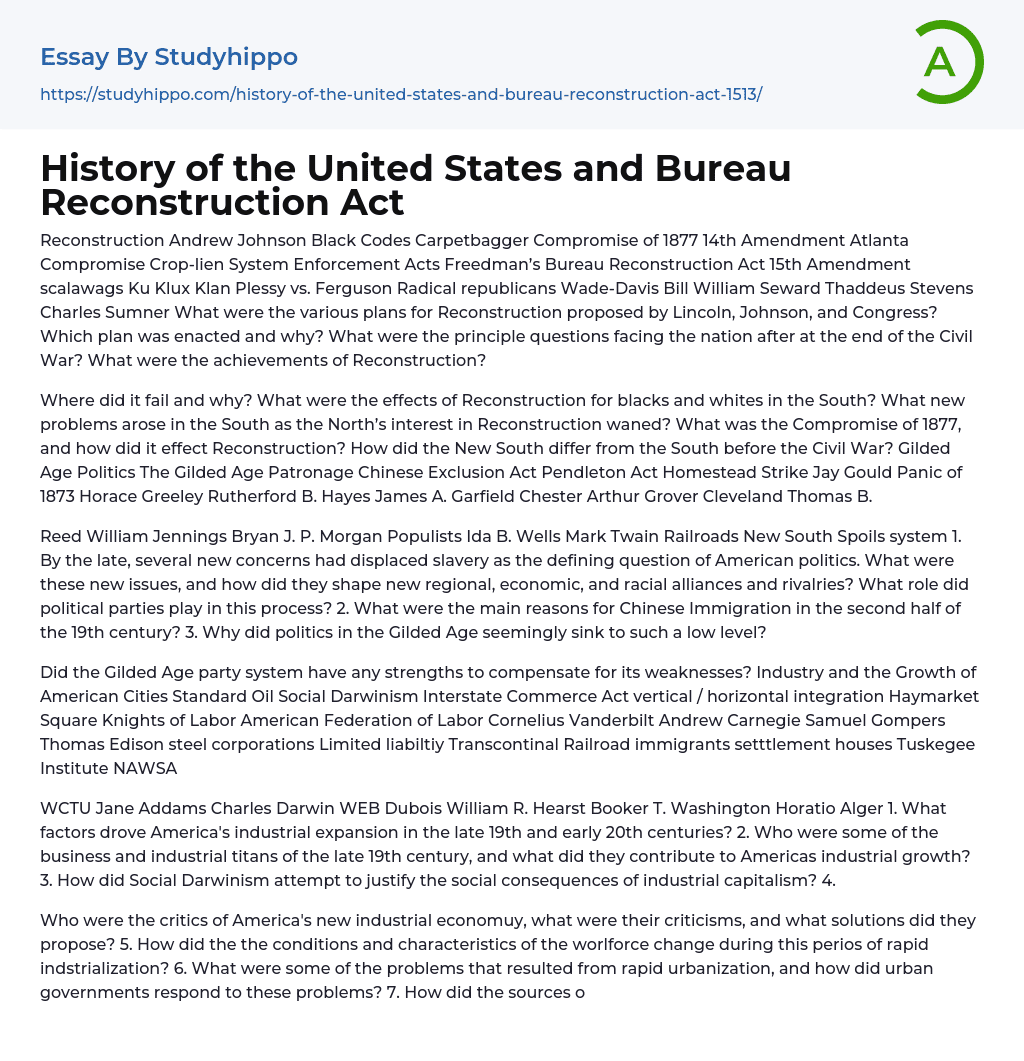

History of the United States and Bureau Reconstruction Act Essay Example
Reconstruction Andrew Johnson Black Codes Carpetbagger Compromise of 1877 14th Amendment Atlanta Compromise Crop-lien System Enforcement Acts Freedman’s Bureau Reconstruction Act 15th Amendment scalawags Ku Klux Klan Plessy vs. Ferguson Radical republicans Wade-Davis Bill William Seward Thaddeus Stevens Charles Sumner
- What were the various plans for Reconstruction proposed by Lincoln, Johnson, and Congress?
- Which plan was enacted and why?
- What were the principle questions facing the nation after at the end of the Civil War? What were the achievements of Reconstruction?
- Where did it fail and why?
- What were the effects of Reconstruction for blacks and whites in the South?
- What new problems arose in the South as the North’s interest in Reconstruction waned?
- What was the Compromise of 1877, and how did it effect Reconstruction?
- How did the New South differ from the
...South before the Civil War?
Gilded Age Politics The Gilded Age Patronage Chinese Exclusion Act Pendleton Act Homestead Strike Jay Gould Panic of 1873 Horace Greeley Rutherford B. Hayes James A. Garfield Chester Arthur Grover Cleveland Thomas B.
Reed William Jennings Bryan J. P. Morgan Populists Ida B. Wells Mark Twain Railroads New South Spoils system
By the late, several new concerns had displaced slavery as the defining question of American politics.
- What were these new issues, and how did they shape new regional, economic, and racial alliances and rivalries?
- What role did political parties play in this process?
- What were the main reasons for Chinese Immigration in the second half of the 19th century?
- Why did politics in the Gilded Age seemingly sink to such a low level?
- Did the Gilded Age party system have any strengths to compensate for its weaknesses?
Industry an
View entire sampleJoin StudyHippo to see entire essay
the Growth of American Cities Standard Oil Social Darwinism Interstate Commerce Act vertical / horizontal integration Haymarket Square Knights of Labor American Federation of Labor Cornelius Vanderbilt Andrew Carnegie Samuel Gompers Thomas Edison steel corporations Limited liabiltiy Transcontinal Railroad immigrants setttlement houses Tuskegee Institute NAWSA
WCTU Jane Addams Charles Darwin WEB Dubois William R. Hearst Booker T. Washington Horatio Alger
- What factors drove America's industrial expansion in the late 19th and early 20th centuries?
- Who were some of the business and industrial titans of the late 19th century, and what did they contribute to Americas industrial growth?
- How did Social Darwinism attempt to justify the social consequences of industrial capitalism?
- Who were the critics of America's new industrial economuy, what were their criticisms, and what solutions did they propose?
- How did the the conditions and characteristics of the worlforce change during this perios of rapid indstrialization?
- What were some of the problems that resulted from rapid urbanization, and how did urban governments respond to these problems?
- How did the sources of immigration to American shift in the late 19th centurey, and what was the native response to the change?
The Great West and the Agriculturial Revolution Battle of Little Bighorn Battle of Wounded Knee Dawes Act Homestead Act Populists Pullman Strike Frederick Jackson Turner William McKinley reservation system Geronimo mechanization of agriculture Coxey's Army Williams Jenings Bryan fourth party system Eugine V. Debs
- What was Populism, what were its goals, and how did the two major political parties respond to these problems?
- What role did the federal government paly in shaping the development of the West?
- How did the arrival and settlement of substantial numbers of settlers
transform the society and economy of the West?
Empire and Expansion
McKinley Tarrif Teller Amendment Rough Riders Great Rapprochement Anti-Imperialists League Platt Amendment Open Door note Boxer Rebellion Hay-Pauncefont Treaty Roosevelt Corollary Theodore Roosevelt William H. Taft John Hay James G. Blaine Josiah Strong Big Sister Policy Liliuokalani Maine Cuban Campaign Panama Canal
- How did the United States become an imperial power?
- What were the main arguments of those who supported U. S. Imperialism and those who opposed the nation's imperial ambitions and efforts?
- Ancient Egypt essays
- Aztec essays
- Great Depression essays
- Salem Witch Trials essays
- Thirteen Colonies essays
- American History essays
- Pocahontas essays
- Prohibition essays
- Articles Of Confederation essays
- Mccarthyism essays
- Patrick Henry essays
- The New Deal essays
- Cleopatra essays
- Pyramids essays
- Jamestown essays
- Manifest Destiny essays
- Benjamin Franklin essays
- Hurricane Katrina essays
- Abolitionism essays
- Atlantic Slave Trade essays
- Slavery essays
- American Revolution essays
- French And Indian War essays
- Industrial Revolution essays
- Civil war essays
- Pearl Harbor essays
- Gettysburg essays
- Civil Rights Movement essays
- Westward Expansion essays
- Adam Smith essays
- Civil Rights Act of 1964 essays
- Slave Trade essays
- Reconstruction Era essays
- Armed Forces essays
- Confederate States Of America essays
- Federal government essays
- Federal Government Of The United States essays
- Fourteenth Amendment To The United States Constitution essays
- Governance essays
- Jurisdiction essays
- Parliament essays
- Politics essays
- 1920S essays
- 1950S essays
- 1960S essays
- 19Th Century essays
- 20Th Century essays
- Ancient Greece essays
- Bravery essays
- British Empire essays



